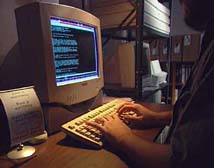The Bush administration released a scaled-back cybersecurity strategy outlining steps that the government, industry and citizens should take to protect computer systems from online attacks
Published:
15 February 2003 y., Saturday
The strategy, which President Bush signed on Jan. 31, has been in development since shortly after the Sept. 11, 2001, terrorist attacks.
Unlike earlier drafts that asked the private sector to take concrete steps to protect their systems, the majority of the final document directs the government to lead by example by tightening the security of federal information systems.
Omitted from the final plan were proposals to ask technology companies to contribute to a security research fund and for Internet service providers to bundle firewall and other security technology with their service.
Instead, the plan urges home and small business computer users to install firewall and anti-virus software. It also calls for the creation of a public-private dialogue to devise ways that the government can reduce the burden of security on home users and businesses.
It also encourages government contingency planning for cybersecurity attacks, including disaster recovery in the event that a major node on the Internet is disabled. Among other cybersecurity defenses, it calls for a network operating center to monitor the health of the Internet and detect attacks and virus outbreaks before they cause much damage.
Šaltinis:
washingtonpost.com
Copying, publishing, announcing any information from the News.lt portal without written permission of News.lt editorial office is prohibited.
The most popular articles
Software company announced new structure_ of it_s business.
more »
 A number of MEPs urged Internal Market Commissioner Michel Barnier to come up with common rules to regulate cross border online gambling in Europe.
more »
A number of MEPs urged Internal Market Commissioner Michel Barnier to come up with common rules to regulate cross border online gambling in Europe.
more »
 Think before you post as once you do it is online forever. That was the message on Safer Internet Day marked on 9 February by a seminar in the European Parliament.
more »
Think before you post as once you do it is online forever. That was the message on Safer Internet Day marked on 9 February by a seminar in the European Parliament.
more »
 50% of European teenagers give out personal information on the web – according to an EU study – which can remain online forever and can be seen by anybody.
more »
50% of European teenagers give out personal information on the web – according to an EU study – which can remain online forever and can be seen by anybody.
more »
 When did the Commission start working on social networking sites?
more »
When did the Commission start working on social networking sites?
more »
 ICSA Labs, an independent division of Verizon Business, is the first independent security-product testing and certification laboratory to earn ISO/IEC 17025 accreditation, validating the laboratory's world-class capabilities.
more »
ICSA Labs, an independent division of Verizon Business, is the first independent security-product testing and certification laboratory to earn ISO/IEC 17025 accreditation, validating the laboratory's world-class capabilities.
more »
 From today, European citizens, businesses and organisations can register .eu website names using characters from all 23 official languages of the European Union.
more »
From today, European citizens, businesses and organisations can register .eu website names using characters from all 23 official languages of the European Union.
more »
 Authorities investigated 301 mobile phone services websites in follow-up to EU crackdown on misleading consumer practices.
more »
Authorities investigated 301 mobile phone services websites in follow-up to EU crackdown on misleading consumer practices.
more »
 After nearly 2 years of legislative work the Telecom Package is due to be put to a final vote in Parliament on 24 November in Strasbourg.
more »
After nearly 2 years of legislative work the Telecom Package is due to be put to a final vote in Parliament on 24 November in Strasbourg.
more »
 The Christian Science Monitor reports that three men have been named as being the masterminds behind the hacking of RBS WorldPay, a subsidiary of the Royal Bank of Scotland.
more »
The Christian Science Monitor reports that three men have been named as being the masterminds behind the hacking of RBS WorldPay, a subsidiary of the Royal Bank of Scotland.
more »
 BAI’s Banking Strategies Insights reports that banks must get serious about improving their ATMs, especially in the area of envelope-free deposit.
more »
BAI’s Banking Strategies Insights reports that banks must get serious about improving their ATMs, especially in the area of envelope-free deposit.
more »